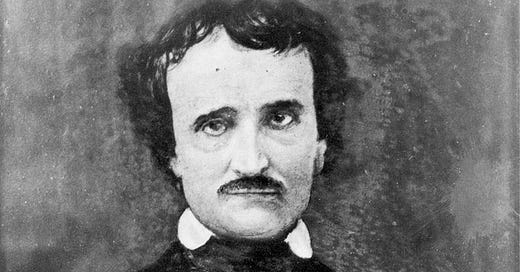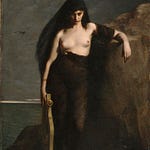In 1829 Edgar Allan Poe was discharged from the American army after two years of service, attaining the rank of Sergeant Major for artillery, which was the highest rank available to him.
He left the army to pursue an appointment at the US Military Academy at West Point. In the interim period between leaving the army and attending West Point, Poe revisited Baltimore. During his stay there, Poe, acting as an agent for his aunt Maria Clemm, sold a 21 year old slave named Edwin, to a man named Henry Ridgeway for $40. The bill of sale for this transaction is in the Enoch Pratt Free Library in Baltimore, it states, in summary…’Know all men by these presents that I, Edgar Allan Poe...sell unto Henry Ridgway...a negro man named Edwin.’
Poe, who was orphaned at an early age, and who had by this time accumulated massive gambling debts at the University of Virginia, was trying to find his own place in his society. Having left the University of Virginia without graduating, was on his way to West Point, to see if he would succeed there. He was court-martialed and formally dismissed from the academy one year later on March 6, 1831.
I can’t think of a more soul destroying task then to sell another human being into slavery. Poe is writing during the period in American history known as the Antebellum, a Latin word meaning before the war and in American history it refers to the period between the war of 1812 and the civil war. Poe was no abolitionist and never really directly addresses the issue of slavery in his writing, however the fact that he facilitated the sale of Edwin to Henry Ridgway is enough for us to confidently ascertain that he was willing to participate in what was a common place feature of the America he lived in. It is however horrible. It is nightmarish. One can imagine the scene, the black haired, wiry Edgar Allan collecting the lonely and broken Edwin, there would have been one or more moments where their eyes would have met. One wonders if Poe ever contemplated what he saw in that eye. What else could he have done? He could have refused to participate. Abolitionists did exist. At the time of Edwin’s sale, it would still be three years before the British Empire would abolish slavery. Horror is a human reaction to this society. It has been argued by some critics that Poe does address race in his writings, but only by metaphor, not directly.
Poe was a man who needed to rise. He had alienated himself from his step father, and he had to hustle in any way he could. I get a sense when reading his writing that his heightened language invites his readers to enter into his erudite world, to feel as if you are some kind of intellectual elite, only to be confronted with the darkness of a soul that is in total damnation. Poe wanted his readers to be pulled into a place where they couldn’t understand the nightmare. Poe lived in a world that was a nightmare. A cold hearted society where being accepted was a matter of life and death. An America that would need to convulse into a bloody and vicious civil war where 620 000 people would die not only from slaughter but off the battlefield from disease and festering wounds. His society was damned and his genre of horror was the product of a person who was an authentic tortured soul.















Share this post